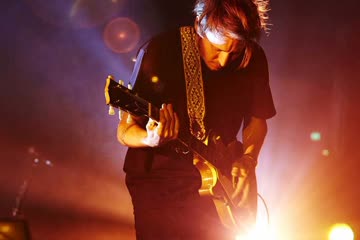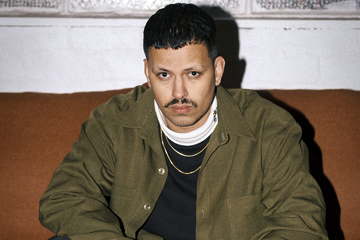REVIEW: 'American Utopia' Is Boldly Humanistic, The Perfect Film For This Moment
'Why haven’t we seen more live shows of this nature?'

American Utopia begins with David Byrne sitting at a table, holding a model of a brain. He sings about its regions and asks the audience to consider its capabilities for reasoning and the ability to form new ideas. This simple presentation feels, with the film’s Australian release in November 2020, to be an act of quiet political defiance.
Originally created as an album in 2018 with Brian Eno, the Broadway production of American Utopia ran for four months until February 2020. Byrne then marshalled the considerable talents of Spike Lee to direct a film of the show. Unlike Disney’s Hamilton or the National Theatre Live series, American Utopia is a real filmic achievement, largely due to Lee’s ability to explode Byrne’s ideas about identity, communication, technology and the sheer oddness of American society that have been gestating throughout his near five decades in music. In Jonathan Demme’s 1984 film Stop Making Sense, the spectre of which never entirely leaves American Utopia, personal songs became joyous collaborations with more and more people joining the throng as the show grew and grew. Here, the decision to make the production so much about compassion gives the songs added depth even as they become possibly more danceable than you remember.

As with Demme’s film, the musicians, decked like Byrne in Maoist grey suits, light grey shirts and without shoes, enter gradually over the course of the first few songs. By the time This Must Be the Place (Naive Melody) arrives four songs into the show, nine musicians are moving in synchrony. More arrive for a brace of Talking Heads songs, I Zimbra, Slippery People and Once In A Lifetime, each reimagined by a culturally diverse all-singing all-dancing band made up of percussionists, a guitarist, a bassist and synthesizer player. Two dancers, Tendayi Kuumba and Chris Giarno, bring more charisma than poise, which is perfect for a show that is more about expressions of identity than virtuosic displays of talent. American Utopia makes the viewer wonder why we haven’t seen more live shows of this nature; productions that allow each musician total freedom across a stage empty apart from other performers. These interpretations push the polyrhythms, strip away the '80s production sheen and give the dozen performers space for their personalities.
As the show progresses, instrumentation, sound and lighting grow more complex and creative. Blocks of light mark out the stage, and the overhead camera allows a greater appreciation of the show than the audience would see. Soon, light sources change, apertures open and, like the silver curtains that cordon the stage, simple designs are used with great imagination to give each song its own identity.
Between songs, Byrne speaks to the crowd, drawing out the themes in the songs and recontextualising them for 2020. Throughout he subtly urges people to be more themselves, to think and dance and express themselves, to be bigger in the world. As he says, “what people like looking at more than anything else, is other people.” Like almost every other American entertainer in 2020, Byrne also makes an impassioned call for people to register to vote but here, in the show’s boldly humanistic context, it doesn’t feel performative.

Ultimately, American Utopia brings to life the tension that has always made Byrne so interesting. An artist who thinks and overthinks and plans and prepares immaculately, then, in the act of performance, attempts to fill his creations with spontaneity. However, glimpses of the man behind the art, once visible in an unrehearsed moment in Stop Making Sense where a lamp tilted off-balance and Byrne let loose a small smile, are almost absent here. The show has been so well-honed and even as the performers throw themselves across the stage, each movement feels meticulously rehearsed. But, true to his art school roots, Byrne seems aware of this and has made the whole show about the wonder of others; an artful presentation of life in the United States in 2020, with anxiety replaced with empathy.
American Utopia may have had a long journey to Australian audiences, but it is the perfect film to be watching right now, and one of the few that will exercise the mind while making you work up a sweat.
David Byrne's American Utopia Is In Cinemas From 26 Nov.







